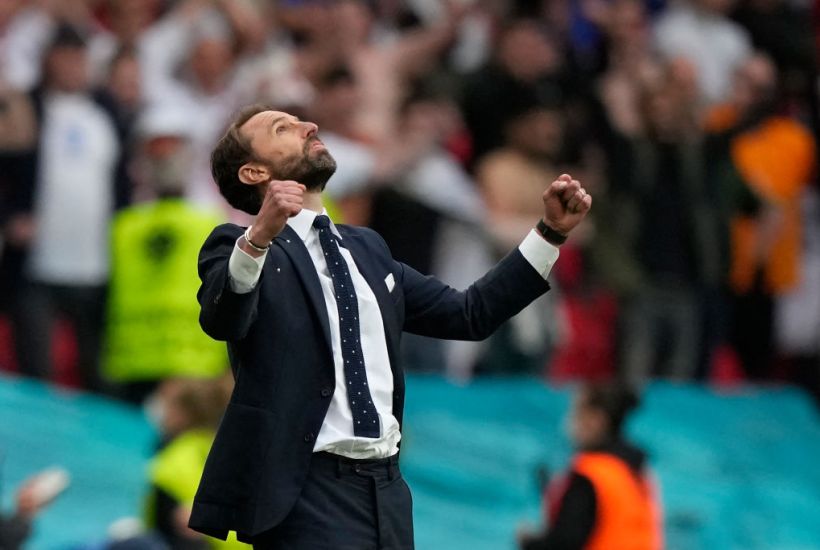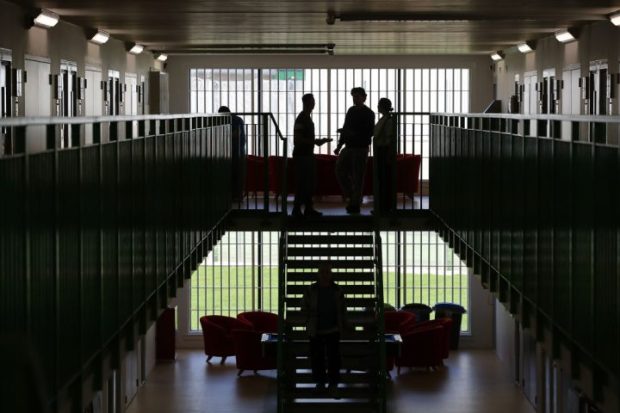War analogies are a cherished football tradition. From chants of ‘Stand up if you won the war’ to the Daily Mirror’s infamous 1996 headline ‘Achtung! Surrender – For you Fritz, ze Euro 96 Championship is over!’ But the Euro 2020 tournament has been marked by restraint from the British tabloid media. It’s as if someone had told them not to mention the war.
Unperturbed by the comparative quiet on the war-theme front this year, Gareth Southgate has gone out guns blazing in an interview with the Telegraph. Ahead of England’s final against Italy on Sunday, he told the paper that it was a kind of Blitz spirit that allowed his side to prevail over Germany in the round of 16: ‘people have tried to invade us and we’ve had the courage to hold that back. You can’t hide that some of the energy in the stadium against Germany was because of that.’ The 2-0 result came as a cathartic victory for England after decades of injured pride. But it was also a major achievement for the manager personally who must have felt a degree of vindication for his missed penalty in the Euro 1996 semi-final against Germany.
Southgate went on to praise the country’s historic achievements, arguing that ‘we have got so much to be proud of. For an island our size, we’ve got an incredible influence on the world.’ He sees the tournament as a chance for England to regain a sense of national pride and togetherness that may have depreciated during the pandemic and due to a tendency to ‘look at the negatives of our own country.’
Even before the tournament began, Southgate was not afraid to invoke England’s war-time spirit within the team and the whole country. He wrote an open letter entitled ‘Dear England’ in which he explored what national pride meant to him. His grandfather served in the Royal Marines during the Second World War and it’s the courage of this war-time generation that left a strong impression on the 50-year-old. To him England stands for positive values such as inclusivity and tolerance.’
While Southgate’s rallying of the troops may be a far cry from the provocative headlines of old, it will no doubt find its critics as left-leaning newspapers have already expressed their concern regarding the effect of war-like rhetoric. The Independent, for example, listed ‘The most problematic England v Germany’ headlines, condemning the lot of them as ‘lazy’, ‘xenophibic’ and ‘distasteful’. The pre-existing angst on the left around the Union Flag has now been transferred to the enthusiastic mass display of St. George’s cross.
Underlying the criticism of war rhetoric in football is the fear that a destructive kind of nationalism will emerge from it. As far back as 1966, the German ambassador in London was concerned that a victory of West Germany over England in the world cup final at Wembley would destroy the reconciliation achieved in the wake of the Second World War. In turn, during the 2006 world cup in Germany, the Foreign and Commonwealth Office took efforts to stop the fans chanting war-themed slogans – needless to say, to little avail.
As a German-born historian, living in England I have lost count of the war jokes I have been subjected to. Apparently, I ‘blitz’ things when I work quickly, tissues appear on my desk on VE day. Naturally, this is accelerated during international football tournaments when arguments with me mustn’t go to penalties. But the number of war jokes pales in comparison to the national embarrassment about them. For every jovial ‘Two World Wars and One World Cup’ there seem to be three apologies. But football nationalism is nothing to be ashamed of. It is neither dangerous nor embarrassing. It’s a harmless outlet of national pride.
Of course there are real historical issues in comparing war and football. A baseline problem is the conflation of England and the UK, for example. In addition, the nationalist pride inspired by the games also often leads to ugly scenes of violence before and after the matches. Online, the extreme emotions caused by victory and defeat are amplified on social media. Nasty comments, for example, about an image of a little German girl crying at the defeat of her country in the round of 16 were treated as if they stood in for the nature of football culture in this country.
On the whole, however, football nationalism is a benign outlet for patriotic pride. In the build-up to the 2006 world cup in Germany, politicians and public figures spent many a sleepless night pondering what the flag-waving and proudly-shouted chants of ‘Sieg’ would do to the collective national mind. As a sea of black-red- and gold hung from German windows, fluttered from cars on the autobahns and adorned the faces of school children, many a commentator foresaw the return of a dangerous breed of German nationalism. When Germany was beaten by Italy 2-0 in the semi-finals, there were indeed ugly chants and in places the anger spilled over into physical and verbal assault. But once the disappointment had been vented, so the unrest quietened. The flags were rolled up and stashed away for the next tournament. Most commentators agreed that the competition had not only been a success overall but good for Germany too.
Gareth Southgate’s appeal for a rediscovery of English pride and history is not the thin end of a jingoist wedge. It cannot be right that the country’s enormous sacrifice during two world wars should be forgotten while its sins must forever be on display. If football thus becomes a focal point for England to celebrate its achievements and the positive values that unite its people and colours its national character, then this is something to be applauded. Southgate is right to point out that modern England stands for inclusion and tolerance, values represented by the diverse team of players he leads. Rarely has there been an England team so unassuming and modest. They are a set of players to take pride in.
As excitement is growing in the buildup to the Euro 2020 final between England and Italy, so too is the amount of flags on display. Some schools have given their pupils permission to come in late on Monday. Supermarkets are shutting early so that their staff can watch the game. Pubs and outdoor venues will be packed, streets deserted and empty. The buzz, the shared hopes and the togetherness the success of Southgate’s team have already created is good for a country divided by Brexit, culture wars and covid. Years of hurt indeed never stopped this country dreaming. Come on England. <//>
Got something to add? Join the discussion and comment below.
Get 10 issues for just $10
Subscribe to The Spectator Australia today for the next 10 magazine issues, plus full online access, for just $10.




















Comments
Don't miss out
Join the conversation with other Spectator Australia readers. Subscribe to leave a comment.
SUBSCRIBEAlready a subscriber? Log in